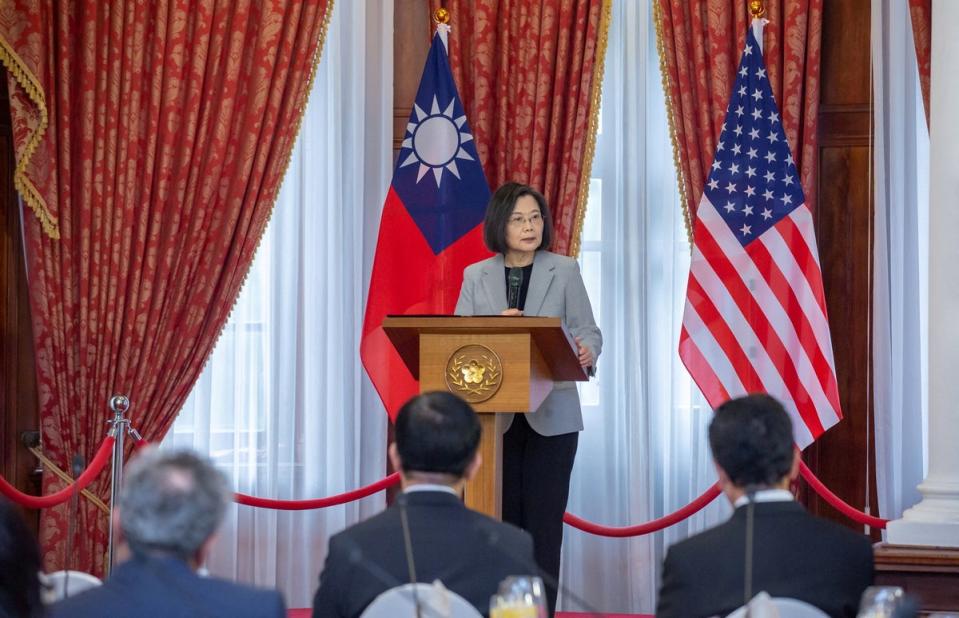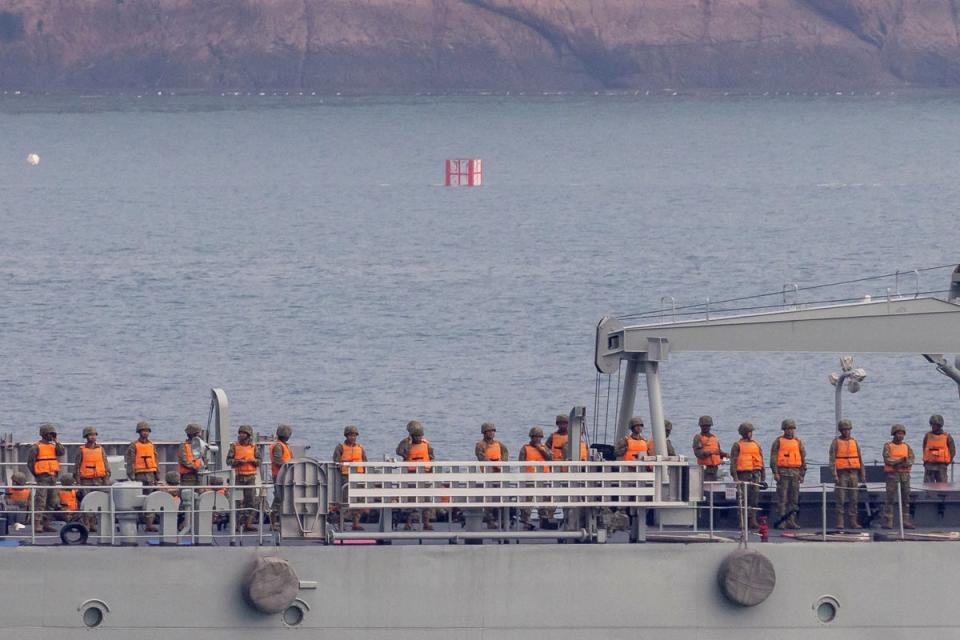Taiwan says Chinese warships remain around island even after Beijing claims drills have ended
Chinese warships were still present in the waters around Taiwan on Tuesday even after Beijing announced the end of war games that ensued in retaliation against the Taiwanese president's US visit.
The Chinese military began a three-day “combat readiness patrol" around the self-governed island on Saturday, a day after president Tsai Ing-wen returned to Taipei following a meeting with US House speaker Kevin McCarthy in California.
Although Beijing said on Monday night the drills had ended, Taiwan's defence ministry said eight Chinese ships remained in waters around the island.
China simulated precision attacks and blockades of Taiwan during the drills, sending up dozens of fighter jets and bombers.
The Asian giant flew a record 91 military aircraft on Monday around the island, with 54 of them crossing the Taiwan Strait.
According to Taiwan's defence ministry, China flew 15 carrier-based J-15s, most likely flying from China's Shandong aircraft carrier, flying east of Taiwan. The island has been tracking the Shandong in the Western Pacific since last week.
At the end of the war games, China declared it was "ready to fight at all times and can fight at any time to resolutely smash any form of 'Taiwan independence' and foreign interference attempts".
China has beefed up its military harassment around the island in recent years by routinely flying aircraft that violate the self-governed island's airspace. Beijing claims Taipei is obliged to reunite with the mainland, by force if necessary, and has no right to conduct foreign relations.
Taiwan has been self-ruled since it split from the mainland in 1949 following a civil war.
91 PLA aircraft and 12 PLAN vessels around Taiwan were detected by 6 a.m.(UTC+8) today. R.O.C. Armed Forces have monitored the situation and tasked CAP aircraft, Navy vessels, and land-based missile systems to respond these activities. pic.twitter.com/4OdCJgTGEc
— 國防部 Ministry of National Defense, R.O.C. 🇹🇼 (@MoNDefense) April 11, 2023
The combat exercises were similar to ones conducted by China last August, albeit smaller in comparison, when it launched missile strikes on targets in the seas around the island following then US House speaker Nancy Pelosi's visit to Taiwan.
The large-scale war games serve as both intimidation and as an opportunity for the Chinese troops to practice sealing off the island by blocking sea and air traffic.
President Tsai denounced the drill, stating that it has caused "instability" on the island.
Ms Tsai said that as president, "I represent my country to the world", and that her visits abroad, including stops in the US, are not new and what Taiwan's people expect.
"This is not a responsible attitude for a major country in the region," she said.
"Although China's military exercises have come to an end, the nation's military and national security team will continue to stick to their posts and defend the country," she added.

The war games have also been a concern for Japan, with Tokyo following the drills around Taiwan "with great interest".
Washington maintains that Ms Tsai's transition through the US and a congressional visit to Taiwan were normal and didn't have any reason for China to "react in any way militarily".
"There's no reason for tensions across the Taiwan Strait to devolve into any kind of conflict," White House national security council spokesperson John Kirby said.
China responded immediately to the McCarthy meeting by imposing a travel ban and financial sanctions against those associated with Tsai's US stopover.

The US Navy's guided-missile destroyer – USS Milius – conducted a navigational rights and freedoms mission in the disputed waters of the South China Sea near the Spratly Islands on Monday.
Beijing claimed the US "illegally trespassed" into waters near the reef without the permission of the Chinese government.
Meanwhile, the US and Philippines on Tuesday launched their largest combat exercises in decades in waters across the South China Sea and the Taiwan Strait despite a warning from China.
The annual drills by the longtime treaty allies called Balikatan – Tagalog for shoulder-to-shoulder – will run up to 28 April and involve more than 17,600 military personnel.
The latest display of American firepower will include live-fire drills and a boat-sinking rocket assault.

